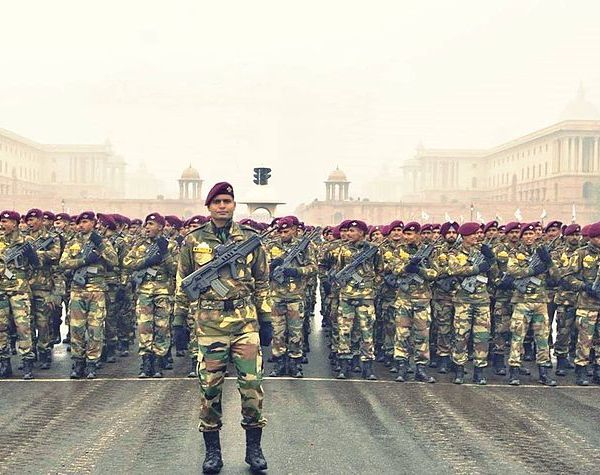The following op-ed originally appeared in The Globalist.
After the raid into Myanmar: Beware of boundless missions, India.

Indian Paratroopers on parade. (Credit: Wikimedia)
This week, India’s military staged a covert operation into neighboring Myanmar (Burma) to target two camps of ethnic separatist militants. The action was taken in order to eliminate the source of recent unprovoked attacks that killed 30 Indian troops near the border.
Assertive or jingoistic Indians are happy that the military action had shades of the U.S. Seal Team Six raid on Abbottabad, Pakistan to kill Bin Laden. The broadly enthusiastic public reaction in India seemed to be almost comparable.
In U.S. style, Indian Air Force drones monitored the operation, which lasted 13 hours and involved helicopters dropping in special forces commandos. To avoid detection, they crawled along the ground a significant distance toward two camps, which they destroyed along with dozens of combatants. India reportedly suffered no casualties.
India’s government elected not to notify Myanmar’s government until the operation was nearly complete. On paper, the two countries have a mutual security agreement. This is meant to allow for coordination on cross-border defensive operations precisely like this one.
Instead, Prime Minister Narendra Modi opted for a unilateral approach. It is in line with a more muscular and assertive approach, to differentiate his defense posture for India from what is generally seen, depending on one’s political leanings, as the more timid (or circumspect) mode of his predecessor in such matters.
India as a major military power
Myanmar aside, the Indian government – once again led by the nationalist Bharatiya Janata Party (BJP) – has also escalated military responses to incidents in disputed Kashmir.
At first blush, this looks like a revival of the tit-for-tat antagonism that led India and Pakistan to war in 1999. And India has also worried about rebels in Myanmar for some time. But there is a difference: today, India has a much larger role on the global security stage than ever before.
India has become the world’s top-ranking purchaser of major arms by volume. India imported 15% of arms sold worldwide from 2010-2014 – the largest buyer by a wide margin.
Sushma Swaraj, India’s External Affairs Minister recently hailed rescue operations by India’s military in Ukraine, Iraq, Libya and Yemen. It’s an important point of prestige, as Ms. Swaraj explained: “India’s image has emerged out to be a strong nation in one year so much that even the developed nations like Germany, France and even US sought our assistance…”
The Myanmar operation suggests India is no longer solely focused on rivalries with Pakistan or China and envisions a broader role for itself. One minister announced: “This is a message to neighbors who harbor terrorists,” a category in which he included countries as far afield as Iraq and Yemen. The military echoed this warning to “perpetrators of terror wherever they are.”
US as a poor model for India
Countries like India have long been very opposed to a muscular, borderless and unilateral U.S. military path. Given these recent policy shifts and rhetoric from India’s current government, it would seem some Indian policymakers are actually now keen to emulate that model.
“Might makes right” is the mantra of those activists. However, in the long run, even the U.S. military elite has found these unending little operations exhausting.
And this approach ultimately does little to change realities on the ground. As the United States has found out to its great frustration, such strikes only have a very momentary effect – however politically popular they may be.
At best, they are much like the (futile) effort of decapitating a hydra: the more you chop it off, the more (and faster) other heads of the hydra grow in. At worst, over-reach becomes one’s own death by a thousand cuts.
It is one thing to have a powerful and professional military. It is another to use it wisely. Beware of boundless missions, India.






